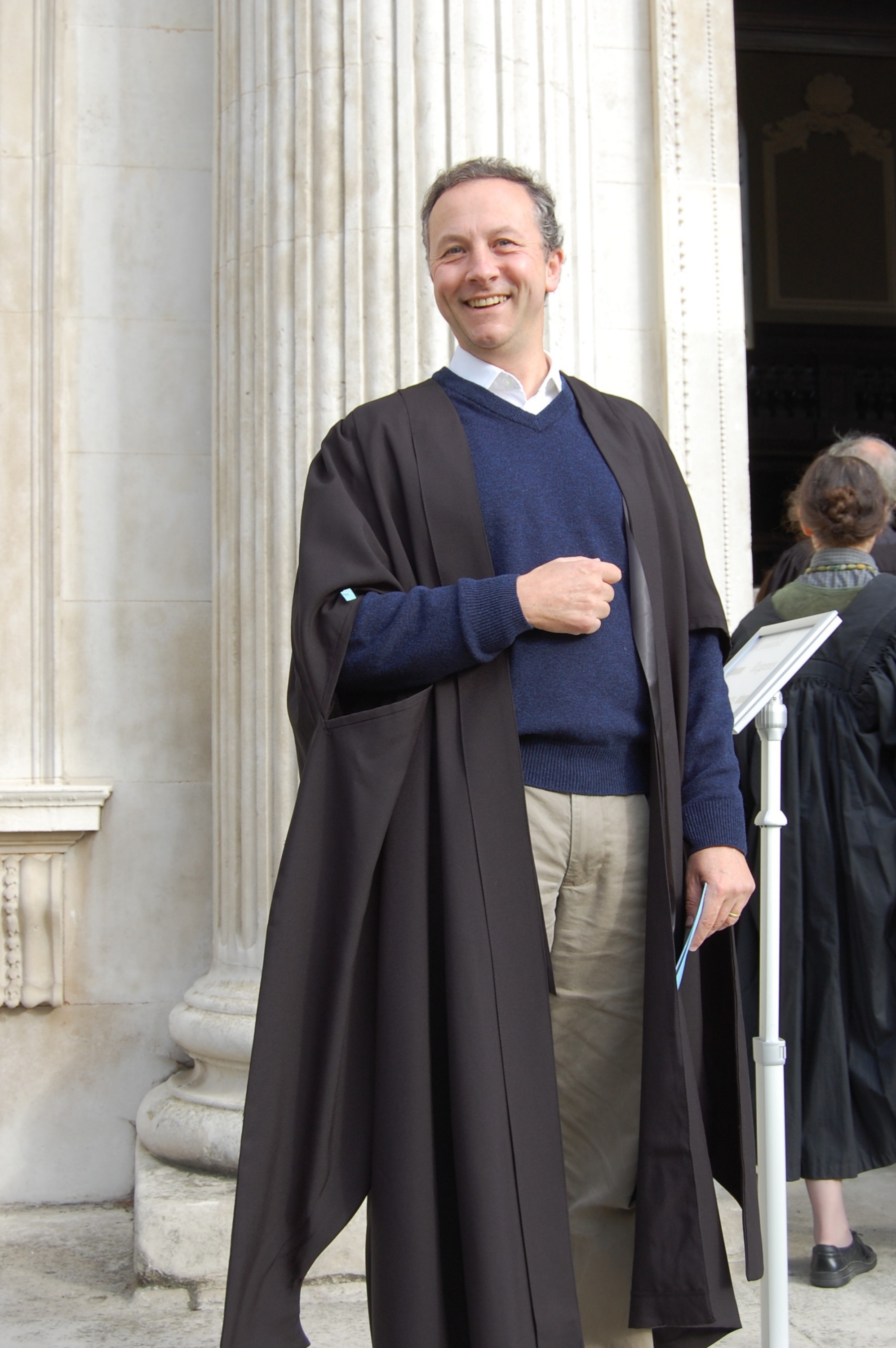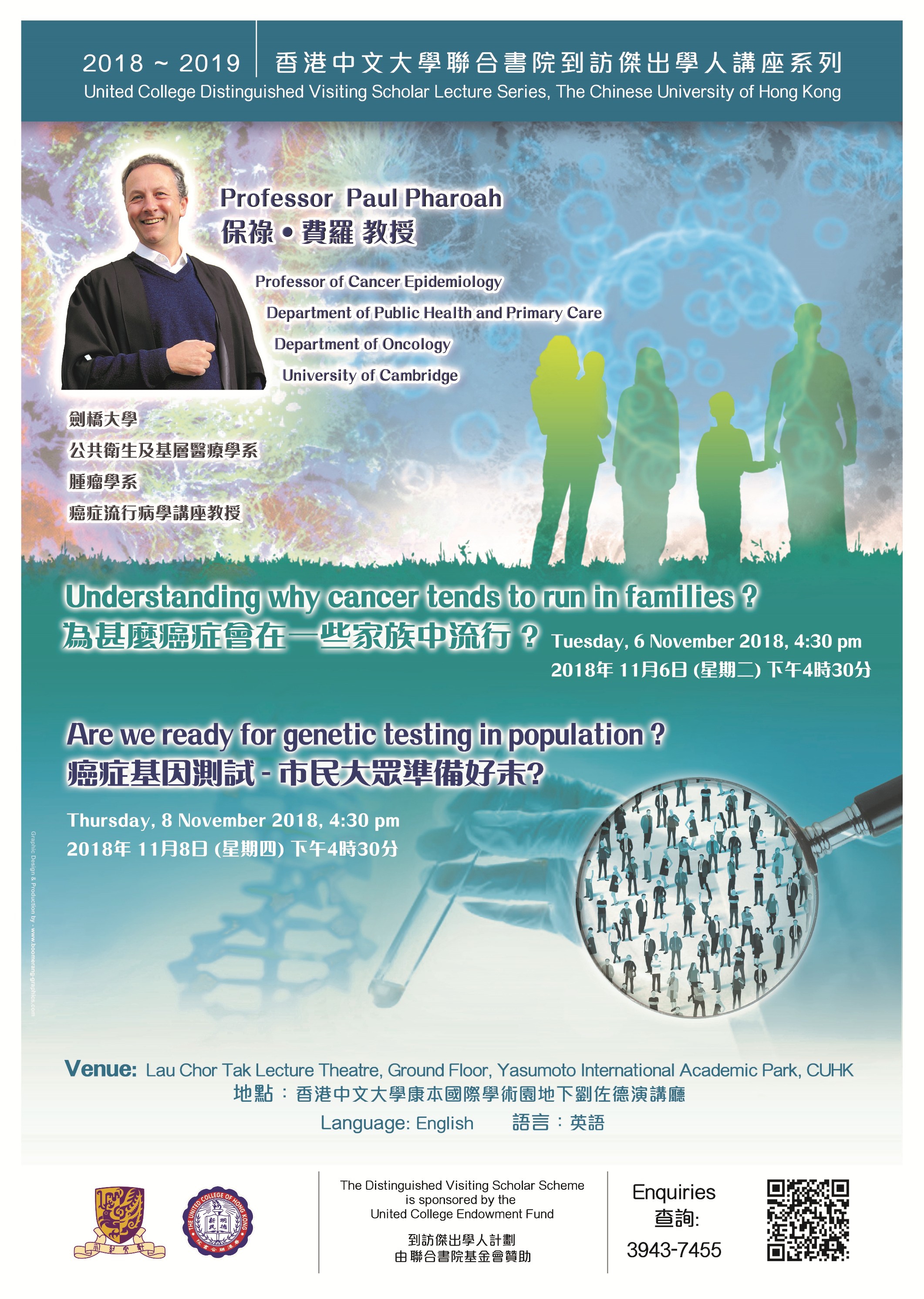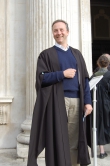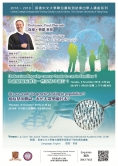CUHK
News Centre
CUHK United College Distinguished Visiting Scholar Prof. Paul Pharoah to Give Talks on Cancer Tendencies in Families and Genetic Testing
The United College of The Chinese University of Hong Kong (CUHK) has invited Professor Paul Pharoah, Professor of Cancer Epidemiology, University of Cambridge, to be the College’s Distinguished Visiting Scholar in 2018-19. Professor Pharoah will visit the College from 4 to 11 November 2018 and deliver lectures on “Understanding why cancer tends to run in families?” and “Are we ready for genetic testing in population?” The visit of Professor Pharoah is supported by the United College Endowment Fund.
Both lectures will be delivered in English. Members of the public are welcome. Details are as follows.
|
Lecture 1: Understanding why cancer tends to run in families? |
|
|
Many research studies have shown that cancer tends to run in families. This may happen because related individuals in families tend to have a similar genetic make-up. Another explanation is that people in families tend to have similar lifestyles and share the same environment. Studies of twins have shown that it is our inherited genetic make-up that is the most important of these two alternatives but shared lifestyle/environment is important too. In the past twenty years, many of the genetic differences between individuals that are responsible for familial cancer have been identified. |
|
|
Date: |
Tuesday, 6 November 2018 |
|
Time: |
4:30 pm – 6:00 pm |
|
Venue: |
Lau Chor Tak Lecture Theatre, G/F, Yausumoto International Academic Park, CUHK |
|
|
|
|
Lecture 2: Are we ready for genetic testing in population? |
|
|
Genetic differences (or variation) are responsible for many of the physical differences between individuals, such as eye colour and height. Some genetic differences are also associated with disease risks. For example, some rare variants in the gene BRCA1 are associated with a lifetime risk of approximately 60 per cent for breast cancer and 40% for ovarian cancer. In the past, genetic testing to find BRCA1 mutations was labour intensive and expensive and only available to individuals with a strong family history of disease. The cost of genetic testing is now much less and so it would be possible to test whole populations for genetic mutations. However, this raises scientific, clinical and ethical issues that need to be addressed before population testing could be recommended. |
|
|
Date: |
Thursday, 8 November 2018 |
|
Time: |
4:30 pm – 6:00 pm |
|
Venue: |
Lau Chor Tak Lecture Theatre, G/F, Yausumoto International Academic Park, CUHK |
Lecture details: http://www.cuhk.edu.hk/uc/dvs/2018-19
Registration: https://cloud.itsc.cuhk.edu.hk/webform/view.php?id=340232
For further information, please contact Mr. George W.Y. Lam at 3943 7598 or Ms. Amy C.Y. Yeung at 3943 7455, Dean of Students’ Office, United College, CUHK.
Biography of Professor Paul Pharoah
Professor Pharoah obtained his medical degree from the University of Oxford in 1986. He started his research in the genetic basis of cancer at the University of Cambridge in 1996 and was promoted to Chair Professor in Cancer Epidemiology in 2012. He has been the key person in numerous cancer study projects in the UK, across Europe and around the world. Nowadays the genetic landscape of cancer is clearer, thanks to Professor Pharoah’s work and that of many other researchers. It enables proper use of genetic testing in suitable patients and can predict the future risk for their family members, as well as for those who carry such mutations. He has published over 500 papers. The majority of them have appeared in high tier journals, like Nature, Science, New England Journal of Medicine, JAMA, and the Journal of the National Cancer Institute. His H-index is over 100.
He also masterminded important tools that we now use in everyday clinical work. For example, the probability of having a gene mutation can be assessed by his web based programme. Professor Pharoah also serves in various UK and international organisations and advisory bodies such as the National Cancer Institute’s PDQ® Cancer Genetics Advisory Board which sets guidelines on how to manage patients with familial cancers.







